|
|
|
Sort Order |
|
|
|
Items / Page
|
|
|
|
|
|
|
| Srl | Item |
| 1 |
ID:
145809
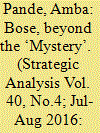

|
|
|
|
|
| Summary/Abstract |
Netaji Subhas Chandra Bose has featured prominently in the news—and hence the public consciousness—only from time to time. As was often the case earlier, the recent prominence he has been given has been confined largely to the classified files concerning him and the mystery surrounding his death—reported or real. Although public and media activism can be credited for the pressure built up which led to the partial declassification of files, it is time now to go beyond these limited aspects of the life and times of a personality as great as that of Bose. It is time now to start looking at other, greater aspects and perspectives that bring out the dynamic and multi-faceted life he led. Particularly the larger-than-life persona of Bose—Bose the philosopher, the leader, the statesman and then of course Bose the diplomat par excellence. All these aspects of his personality are clearly evident in his tryst with the Indian National Army (INA), the formation of the Provisional Government of Free India and his engagement with expatriate Indians/the Indian diaspora in Southeast Asia, which is exactly what this article attempts to bring out.
|
|
|
|
|
|
|
|
|
|
|
|
|
|
|
|
| 2 |
ID:
145808
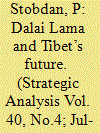

|
|
|
|
|
| Summary/Abstract |
In an ominous way the Dalai Lama recently threatened to terminate the over 400-year-old spiritual lineage of his position, saying that Tibetans no longer require the authority of the Dalai Lama and it would be a shame if a ‘weak’ person succeeded him.
|
|
|
|
|
|
|
|
|
|
|
|
|
|
|
|
| 3 |
ID:
145817
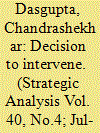

|
|
|
|
|
| Summary/Abstract |
One of the most popular anecdotes of the 1971 war is Field Marshal Manekshaw’s tale of how he restrained an impatient Indira Gandhi from ordering an unprepared Indian army to march into East Pakistan in April. The Field Marshal’s prowess as a raconteur fully matched his military skills but exceeded his grasp of the political and diplomatic dimensions of the grand strategy shaped by Indira Gandhi and her advisors. The prime minister had no intention of going to war in April since India’s political aims could not have been achieved at that stage simply through a successful military operation.
|
|
|
|
|
|
|
|
|
|
|
|
|
|
|
|
| 4 |
ID:
145812
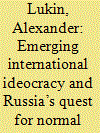

|
|
|
|
|
| Summary/Abstract |
This article analyses modern Western society from the standpoint of the concept of ‘ideocracy’. The author suggests that the development of mass societies and mass ideologies—noted by a number of theorists and philosophers since the end of the 19th century—led to a qualitatively new level of social development in the second half of the 20th century. The globalisation of the economy and mass communications has led to the globalisation of the masses, beyond the confines of national borders. That, in turn, has served as the basis for the appearance of a new social structure: the international ideocracy. This article describes the primary features of that structure, the path of its likely development and its interaction with the non-ideological world—as defined by the notion of ‘normalcy’. It also examines Russia’s possible path of development as a state that finds itself on the borders of ideological societies.
|
|
|
|
|
|
|
|
|
|
|
|
|
|
|
|
| 5 |
ID:
145813


|
|
|
|
|
| Summary/Abstract |
This article argues that while the concept of peace building proved beneficial to Western society, it drew flak in pre-2014 Afghanistan for its inbuilt faults, the overarching US–Taliban conflict and the state failure towards meeting the prerequisites of the coalition strategy. It also argues that peace building in the immediate future of post-2014 Afghanistan is improbable due to the existing and likely conflicts between and among the Afghan government, the Taliban and the newly emerging Daesh or IS group for power, group and ideological domination. The given predicament, the article notes, is fraught with serious consequences for the war-haggard Afghans, their fragile country and its sensitive neighbourhood.
|
|
|
|
|
|
|
|
|
|
|
|
|
|
|
|
| 6 |
ID:
145814


|
|
|
|
|
| Summary/Abstract |
This article explores the backdrop of the engagement between the International Community (IC) and the Government of Sri Lanka (GoSL) over the conduct of the military during the last stages of its engagement with the secessionist Tamil militants which (especially from January to May 2009) led to a humanitarian crisis. The efforts of the IC to persuade the GoSL to halt the military operations and the Liberation Tigers of Tamil Eelam (LTTE) to concede defeat, to ensure human security, were a failure. This article discusses the IC’s engagement with the GoSL, which followed an ambivalent posture—advocating a political solution as a means of ending the war while supporting the GoSL’s military engagement—and explores how such deliberate ambivalence enabled the GoSL to subvert the authority of the IC and consolidate its position both locally and globally, to take the military engagement to a decisive conclusion. Furthermore, the paper contends that the GoSL could successfully, albeit temporarily, resist the IC’s efforts at intervention to safeguard human security in the war zone, which led to a humanitarian crisis in Sri Lanka.
|
|
|
|
|
|
|
|
|
|
|
|
|
|
|
|
| 7 |
ID:
145810


|
|
|
|
|
| Summary/Abstract |
The results of the most recent Parliamentary and Assembly of Experts elections in Iran indicate that Iranians are increasingly unhappy with the conservative establishment in the country. The Reformists or moderates and pro-Rouhani group of ‘Hope’ secured a majority in the Assembly of Experts and also won more seats than their rival conservatives or Principlists in the Majlis or parliament. The elections for the two bodies were held on February 26, 2016. After almost a decade, the conservatives lost their majority in parliament, and for the first time since the establishment of the Islamic Republic, they have been badly defeated in the higher and powerful clerical body, the Assembly of Experts. The conservatives lost their majority in the house at a crucial time, when there is a high degree of speculation that this Assembly would have a decisive role in choosing the new Supreme Leader of the country. The most surprising results came from Tehran, where Reformists and their allies won all the 30 seats in parliament. Most of the parliamentarians who strongly opposed the nuclear deal and were sceptical about the final outcome, failed to retain their seats in the new Majlis. Iranians have reposed their confidence and support in Rouhani’s government and sent out a strong reply to conservatives who called the nuclear negotiator team a ‘compromiser’.
|
|
|
|
|
|
|
|
|
|
|
|
|
|
|
|
| 8 |
ID:
145815


|
|
|
|
|
| Summary/Abstract |
India is often perceived as a regional power, but a closer look reveals that it is in a disadvantageous position vis-à-vis China in South Asia. The first reason is that Indian governments never had the political, economic, and military capacities to pursue their regional power ambitions with their neighbours in the long run. South Asian countries could always play the China card in order to evade India’s influence. Second, India’s new South Asia policy with the focus on trade and connectivity has improved regional cooperation since 1991. But China remains an economically more attractive and politically more reliable partner for India’s neighbours.
|
|
|
|
|
|
|
|
|
|
|
|
|
|
|
|
| 9 |
ID:
145811
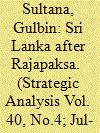

|
|
|
|
|
| Summary/Abstract |
Since the fall of the Mahinda Rajapaksa government, there has been an apparent foreign policy shift in Sri Lanka. There is a growing view that the new National Unity Government (NUG), which came to power in January 2015 with Maithripala Sirisena as President, has shown its proclivities towards India and the US and moved away from China, especially under Prime Minister Ranil Wickremesinghe. In fact, it is commonly believed that the new government is allowing the US and India to increase their influence on Sri Lanka, the same way as Mahinda Rajapaksa had allowed China to increase its presence in the country. However, this essay argues that while relations with the US and India have improved under the current government, it will not be easy for Sri Lanka to come out of the Chinese influence both because of its own economic compulsions—to a large extent engendered by the debt it has availed from China during the last decade—and paradoxically, also because of China’s continued zeal to stay engaged in the economic domain.
|
|
|
|
|
|
|
|
|
|
|
|
|
|
|
|
|
|
|
|
|